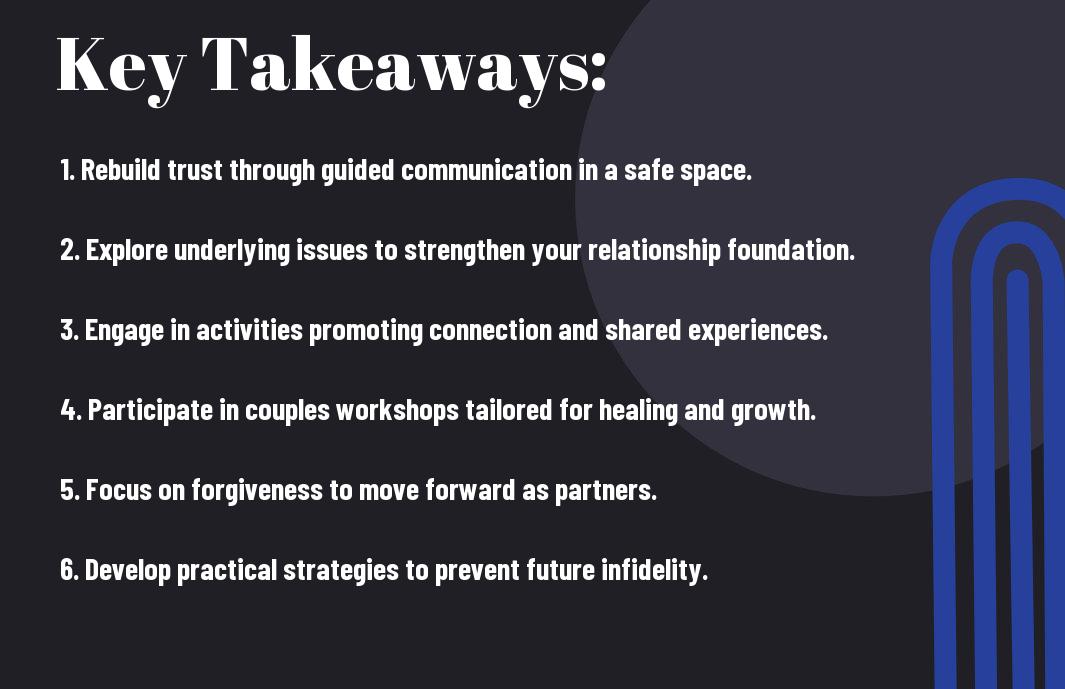Healing after an affair can feel overwhelming, but a marriage counseling retreat offers you and your partner a safe space to rebuild trust and intimacy. By participating in a guided program, you can address the emotional turmoil caused by infidelity, explore the underlying issues, and develop healthier communication patterns. This structured environment fosters teamwork and understanding, allowing you to transform your pain into a pathway for renewal. Embracing this journey together can lead you toward a more resilient and fulfilling relationship.

Key Takeaways:
- Marriage counseling retreats offer a dedicated space for couples to focus on healing and rebuilding trust after infidelity.
- Professional guidance helps both partners express their feelings and understand the underlying issues that contributed to the affair.
- Retreats often incorporate various therapeutic techniques, including communication exercises, conflict resolution strategies, and emotional bonding activities.
- Shared experiences during the retreat can strengthen the emotional connection between partners, fostering intimacy and understanding.
- Time away from daily responsibilities allows couples to reflect on their relationship and prioritize their commitment to each other.
- Engaging with other couples in similar situations can provide valuable support and insights into the healing process.
- Continued growth and healing may require follow-up sessions or ongoing support after returning home from the retreat.


Understanding Infidelity
The journey into understanding infidelity can be complex, as it encompasses a variety of emotional and psychological factors. By grasping the underlying reasons for an affair, you can begin to navigate the path toward healing and rebuilding trust within your relationship.
Types of Affairs
- Emotional Affair
- Physical Affair
- Cyber Affair
- One-night Stand
- Romantic Affair
After identifying the types of affairs, understanding the context can facilitate accountability and enhance your healing process.
Emotional vs. Physical Infidelity
Any distinction between emotional and physical infidelity lies in the nature of the betrayal. Emotional infidelity often centers on a deep, romantic connection without physical intimacy, while physical infidelity involves sexual encounters.
Consequently, both types of betrayal can bring significant pain. Emotional infidelity can lead to feelings of betrayal and jealousy, as it often includes sharing intimate thoughts and feelings with someone outside your marriage. On the other hand, physical infidelity can feel like a violation of your trust and commitment. Understanding these differences is vital for addressing the specific impacts that either type of affair has on your relationship.
The Impact of an Affair on Marriage
Now, an affair can create a seismic shift in your marriage, leading to deep emotional wounds and complicated feelings. It challenges the very foundation of trust and partnership, often resulting in a struggle to find a way forward together. Understanding this impact is crucial as you seek healing and rejuvenation in your relationship.
Emotional Consequences
Behind the surface, an affair inflicts intense emotional pain on both partners. You may experience feelings of betrayal, anger, guilt, and sadness, creating an emotional whirlwind that can overwhelm your ability to communicate effectively. Recognizing these emotional ramifications is the first step toward healing.
Trust Issues and Communication Breakdown
After an affair, trust is often shattered, leading to severe communication breakdowns in your relationship. Open and honest dialogue may seem impossible as underlying insecurities and fears emerge. Each conversation can feel heavy with unspoken judgments or resentment, making it crucial to approach this sensitive territory with care and intention.
Hence, to rebuild your marriage, it is vital to address trust issues and work on restoring effective communication. Explore your feelings openly, share your concerns, and practice active listening. As you navigate the emotional aftermath, prioritize understanding each other’s perspectives and creating a safe space for dialogue. Recall, this journey requires patience and effort from both of you, but with commitment, healing and reconnection are within reach.
The Role of Marriage Counseling
After an affair, seeking the guidance of a marriage counselor can provide crucial support for both partners. Counseling serves as a safe space where you can openly discuss feelings of betrayal, hurt, and confusion. The right counselor will help facilitate communication, foster understanding, and guide you through the process of rebuilding trust. In this environment, healing becomes possible, allowing you to navigate the complexities of your emotions together.
Benefits of Professional Guidance
Behind the closed doors of a counseling session, you’ll find a non-judgmental environment that encourages honest conversations. Professional guidance assists you in identifying the root causes of the affair, offering tools for resolution, and promoting mutual empathy. With expert support, couples are better equipped to strengthen their bond and create a path toward healing.
Selecting the Right Counselor
Against the backdrop of countless options, selecting a counselor can feel overwhelming. You need a professional who has experience specifically with infidelity recovery, as well as the ability to foster a supportive environment for both partners. Consider credentials, specialization, and the chemistry you feel with potential candidates. A therapist who resonates with you can significantly enhance the healing journey.
Also, prioritize meeting with potential counselors individually. Assess how comfortable you feel discussing sensitive topics with them. Look for those who emphasize empathetic listening and a collaborative approach. Trust your instincts when choosing; you need someone who can facilitate not just conflict resolution but also deeper understanding of one another. Finally, checking reviews or seeking recommendations can help in making an informed choice that aligns with your unique situation.
Retreats as a Healing Option
Many couples find that attending a marriage counseling retreat after an affair offers a unique opportunity for healing and growth. These retreats provide a dedicated space where you and your partner can focus entirely on rebuilding trust and connection away from daily distractions. Surrounded by supportive professionals and fellow couples facing similar challenges, you can engage in deep conversations and activities that foster understanding, empathy, and resilience.
What to Expect at a Marriage Counseling Retreat
Across various venues and settings, you can expect a marriage counseling retreat to offer guidance, structure, and a safe environment. Designed for couples at all stages of healing, retreats typically provide personalized counseling sessions, group discussions, and ample opportunities for reflection. You will likely engage in exercises that encourage vulnerability and honesty, which are critical for rebuilding your relationship.
Activities and Workshops Offered
An enriching element of a marriage counseling retreat is the diverse array of activities and workshops tailored to facilitate healing and reconnection. These might include guided communication exercises, role-playing scenarios, and mindfulness techniques aimed at fostering emotional intimacy. You may also participate in workshops that explore topics like forgiveness, rebuilding trust, and setting healthy boundaries. Each activity is designed to enhance your understanding of one another and provide practical tools to help you navigate the complexities of your relationship moving forward.
Retreats often incorporate interactive sessions where you actively engage with your partner in a safe space, allowing for open discussions about your feelings and experiences. Expect to participate in team-building activities that encourage cooperation and teamwork, solidifying your bond. Most importantly, these retreats focus on providing you both with actionable strategies to overcome challenges and bring positivity back into your relationship, all while creating shared memories that lay the groundwork for a healthier future together.
Rebuilding Trust and Connection
Once again, the foundation of your marriage is being tested as you begin on the journey of rebuilding trust and connection after an affair. Understanding that this process takes time, effort, and commitment from both partners is imperative. Open communication, vulnerability, and patience are key elements that can help reignite the emotional bond between you and your partner, allowing you to work towards a healthier and more resilient relationship.
Strategies for Healing Together
Trust can be rebuilt through consistent actions, honest conversations, and shared experiences. Establishing safe spaces to talk openly about feelings, fears, and expectations lays the groundwork for healing. Consider engaging in activities that promote intimacy and connection, such as shared hobbies or date nights, which can help you both reconnect and foster a sense of unity.
Setting Boundaries for the Future
One of the most effective ways to nurture your relationship after an affair is by establishing clear boundaries moving forward. Competitive transparency is imperative—this means both partners should share their feelings and monitor their actions to reinforce the bond you’re building.
Also, be sure to discuss and define your boundaries regarding friendships, social situations, and communication with others. This prevents future misunderstandings and reinforces your commitment to one another. Being open about your *needs and desires* creates a sense of security in the relationship. By setting these guidelines together, you foster a supportive environment, allowing for shared growth and effective healing.
Moving Forward as a Couple
Your journey towards healing after an affair involves rebuilding trust and intimacy as you move forward together. A great way to facilitate this process is by attending Couples Therapy Retreats | Affairs Of The Heart, where you can gain support and guidance from professionals who understand the complexities of your situation.
Creating a New Relationship Foundation
Against the shadows of past betrayal, it’s necessary to lay a strong foundation for your renewed relationship. You should focus on open communication, expressing your emotions honestly, and ensuring that both partners feel heard and valued as you redefine your connection.
Long-term Strategies for a Healthy Marriage
For sustainable love, you must adopt strategies that address both individual growth and relationship dynamics. This includes regular check-ins, shared activities to strengthen your bond, and building routines that prioritize your partnership.
In fact, consistent effort in these areas can empower your relationship to thrive. Engage in active listening during discussions, invest time in shared hobbies, and always express appreciation for one another. Strengthening your emotional connection will foster a sense of trust and security. As you tackle challenges together, prioritize forgiveness while remaining aware of warning signs that could hint at unresolved issues. This approach not only mitigates the risks of future conflicts but also enhances the possibility of a joyful and resilient marriage.
Conclusion
Now that you’ve explored the benefits of a marriage counseling retreat after an affair, you can take meaningful steps toward healing together. These retreats provide a safe space for you and your partner to address underlying issues, rebuild trust, and strengthen your emotional connections. By committing to this process, you can foster an environment of understanding and support, ensuring that your relationship can emerge stronger than ever. Take this opportunity to invest in your future and cultivate a healthier, more fulfilling partnership.
FAQ
Q: What is a marriage counseling retreat after an affair?
A: A marriage counseling retreat after an affair is a specialized program designed to help couples heal and rebuild their relationship following infidelity. These retreats typically offer a structured environment where couples can engage in therapeutic exercises, guided discussions, and workshops aimed at addressing the emotional pain caused by the affair, improving communication skills, and fostering understanding and forgiveness.
Q: How long do these retreats usually last?
A: Most marriage counseling retreats after an affair range from a weekend to a week in length. The duration may vary depending on the program or organization offering the retreat. The timeframe is structured to provide intensive sessions that allow couples to investigate deeply into their issues, interact with trained facilitators, and participate in group activities that promote healing and restoration of trust.
Q: What can couples expect to gain from attending a retreat?
A: Couples can expect to gain a deeper understanding of each other’s feelings, perspectives, and the factors that contributed to the affair. They will engage in therapeutic exercises that help in processing emotions, learning new communication strategies, and developing tools for conflict resolution. Ultimately, the goal is to foster a supportive environment that encourages healing, intimacy, and the rebuilding of trust within the relationship.
Q: Are retreats suitable for all couples affected by infidelity?
A: While many couples can benefit from attending a marriage counseling retreat after an affair, it is necessary to assess whether the retreat aligns with their specific needs. Couples who acknowledge the affair and are willing to work together on their relationship are typically better suited for this type of support. It is advisable for couples to consult with a therapist beforehand to determine if a retreat is the right solution for their unique situation.
Q: How can couples find a marriage counseling retreat after an affair?
A: Couples can find marriage counseling retreats by researching online, reading reviews, or seeking recommendations from therapists or support groups specializing in infidelity recovery. It’s important to consider factors such as the credentials of the facilitators, the retreat’s approach to healing, and the overall environment provided during the retreat. Couples should also inquire about the retreat’s structure and any follow-up support available after the experience to ensure it meets their needs.
